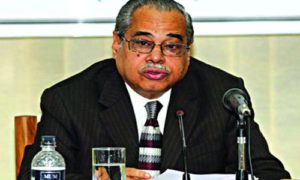10th Parliament Election and Lesson learnt

Kazi Rokibuddin Ahmed, outgoing CEC
Sakhawat Hussain
Elections are considered to be the building block of democracy. If that building block is weak, then the entire system remains fragile. Therefore election has to be legitimate. Legitimacy in any election is subject to a few conditions in which the process has to be legal, morally and socially acceptable as opined by the scholars and researchers. An election may be legally correct, but if it lacks moral and social acceptance, then the entire process loses its credibility. In that measure, just concluded 10th Parliament election boycotted by major opposition and majority of registered political parties might not be socially acceptable. The question of moral acceptance would remain subject to the social debate as 153 out of 300 members of the Parliament were officially declared elected unopposed. It means more than 50 percent of the voters out of 9 crores 19 lacs 65 thousand 429 voters have not voted to choose their representatives. In the simple term, that would weaken the government formed subsequently. Whatever the legitimacy the government claims, it cannot argue that it has the mandate of the majority voters.
The situation that the country had to witness in pre-election days is not in any way augur well in Bangladesh’s future politics. The violence whether it was perpetrated before, during and after elections, equal blame should be accorded to the government’s action and the measures taken by the opposition alliance. There were some opportunities for compromise offered by the government of Sk. Hasina but what is now evident, the opposition had missed those opportunities. Perhaps the opposition underestimated the tenacity of the government and overestimated their street power. Apparently, the stage was set for opposition to subdue stubborn attitude of the government on the issue of the election time government. Therefore, in all fairness one may say that the politicians on both sides of the aisle, wrongly or partially underestimated their capability of holding a reasonably fair election rather than negating the process altogether. The opposition may take solace from the fact that the ruling party failed to manage a minimum presentable election to demonstrate legitimacy to the people of the Bangladesh and countries abroad.
Just concluded election by no measure could be termed as representative; as hardly 25 percent (though the figure remains disputed) of remaining voters voted for their candidates in 147 contested constituencies. That means that only little over one crore out of over nine crore voters had the opportunity to cast their ballots. By sheer numbers and with less than 40% registered political parties participating, it does not appear that the government that was formed was representative of all voters.
Be as it may, this election and its result would remain as an inglorious chapter in the glorious history of Bangladesh Awami League founded by Bangabandhu Sk. Mujibur Rahman, a great champion of democracy. Therefore, an old party of Bangladesh and one of the oldest political parties in the sub-continent must take immediate step to rectify the folly it created, by calling an inclusive 11th Parliament if not annulling the result of this questionable election. In fact, no one can claim to have gained anything out of this election; rather one can surmise, the political system of the country took a step backward. The democratic institutions of the nation and the Bangladesh Election Commission suffered the worst setback. The past election commissions were successful in holding relatively free and fair elections and by comparison, was less bloody and controversial than the 10th parliamentary election.
To conclude, one should not take everything with negativity but look into the positive aspects of this exercise. First and foremost, we should be attentive to peoples’ aspirations for a representative democratic system in which every voter can proudly participate. There has been obvious disappointment displayed by those who did not get the opportunity to exercise their right to vote. Second, we need to ponder and evolve a measure to find a permanent solution to the disputed issue of election time government. Third, it is about time to strengthen our democratic institutions through a national consensus. Let us not look back but use the past folly as a positive lesson to build a great future that Bangladeshis deserve.
